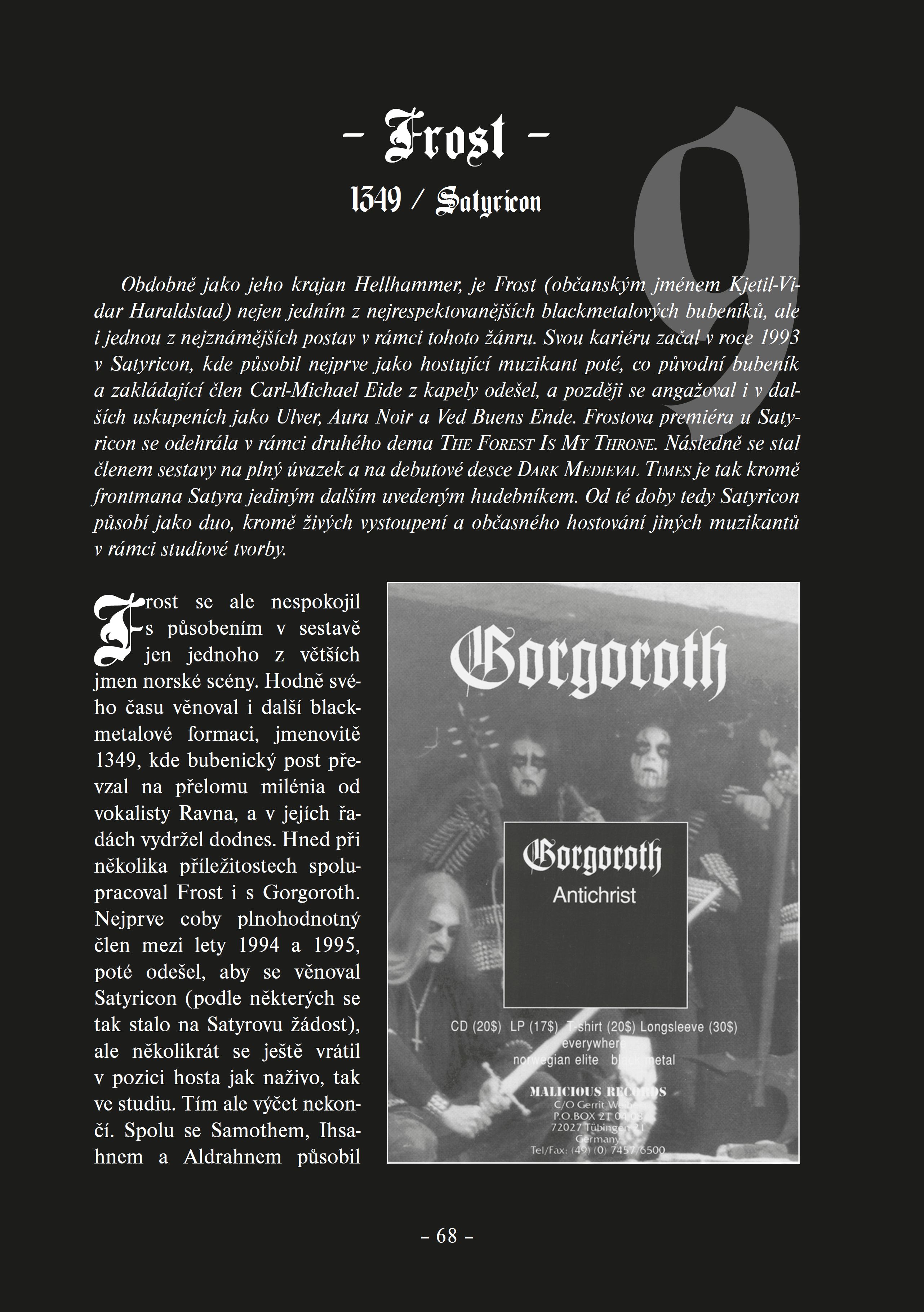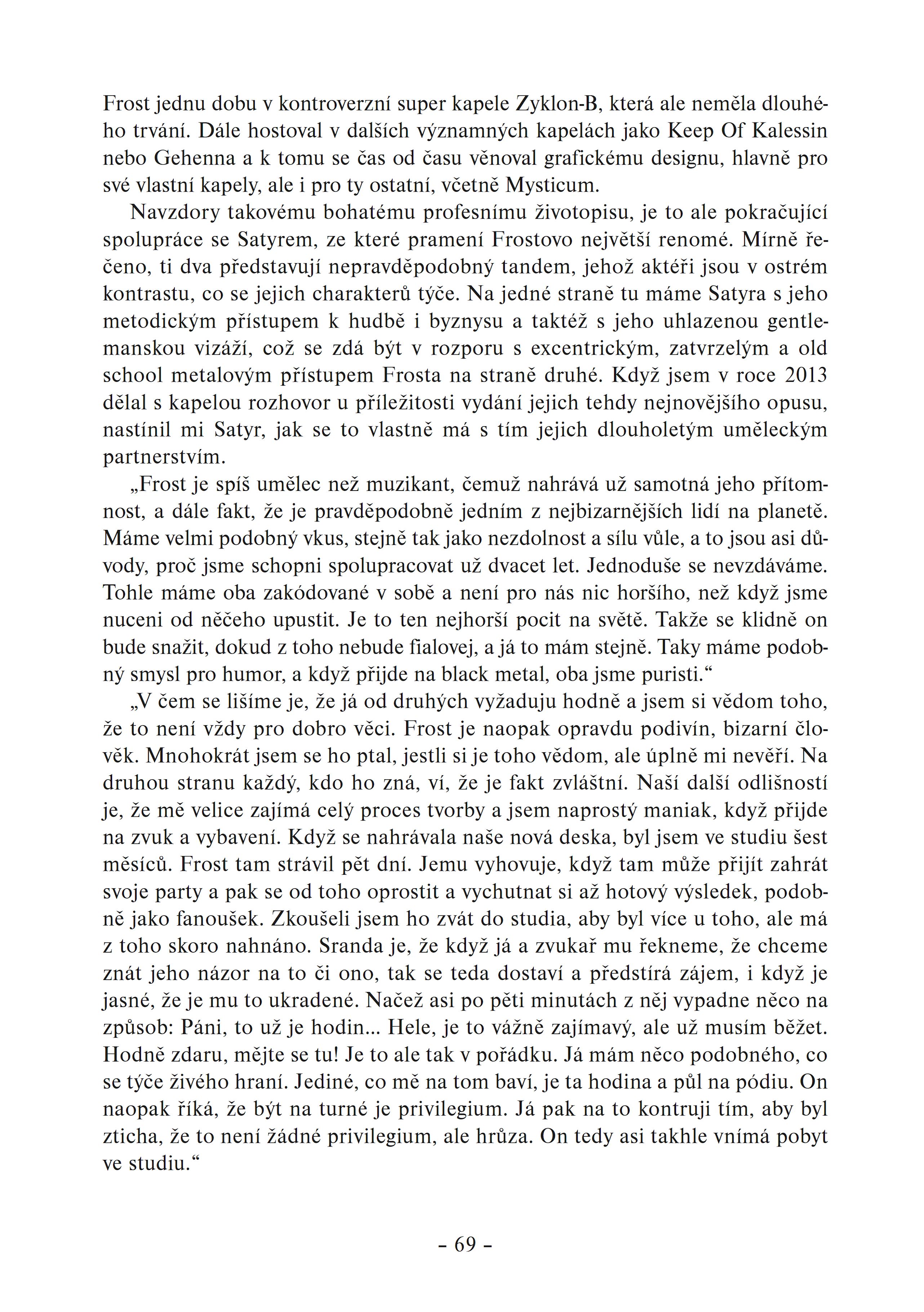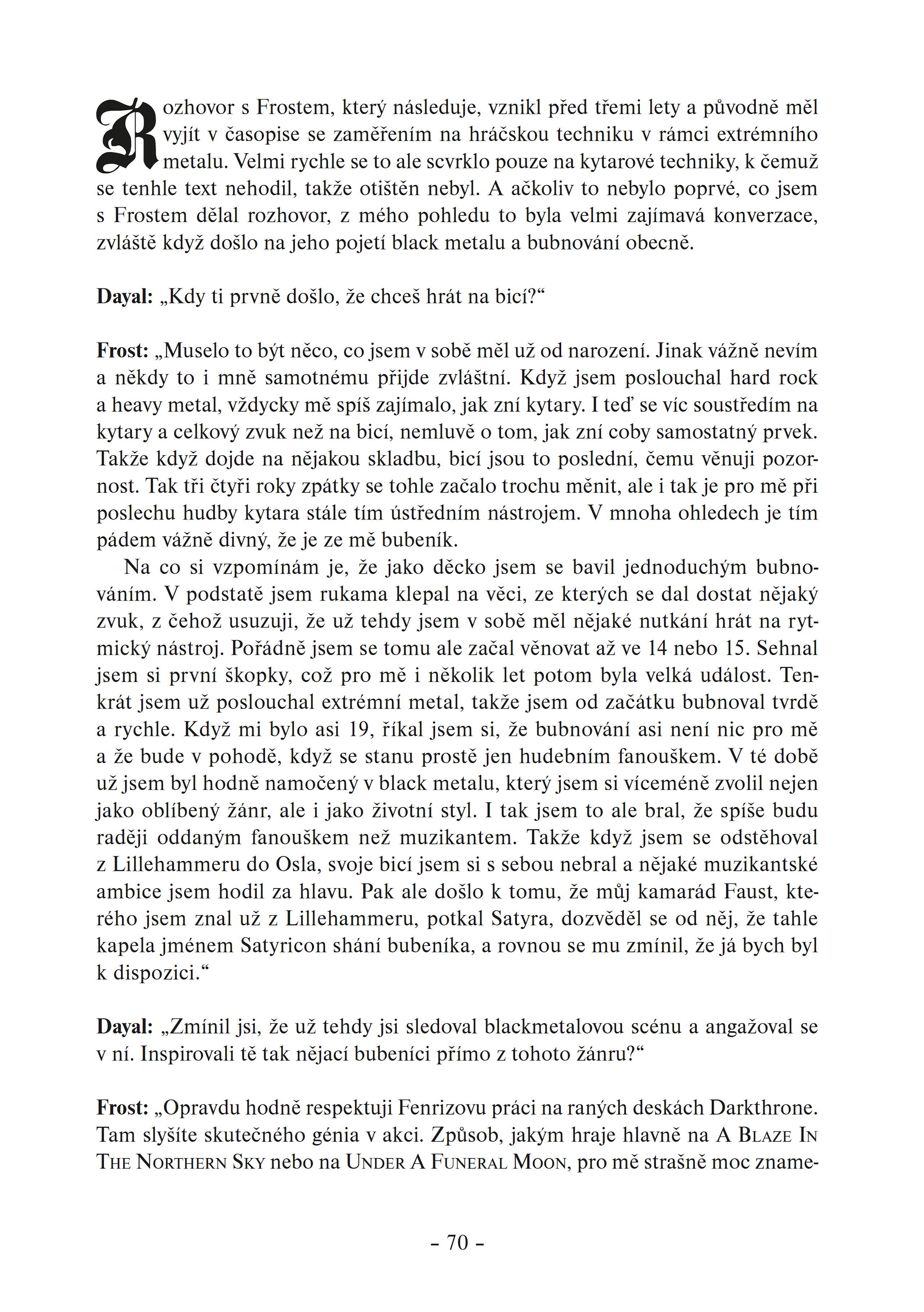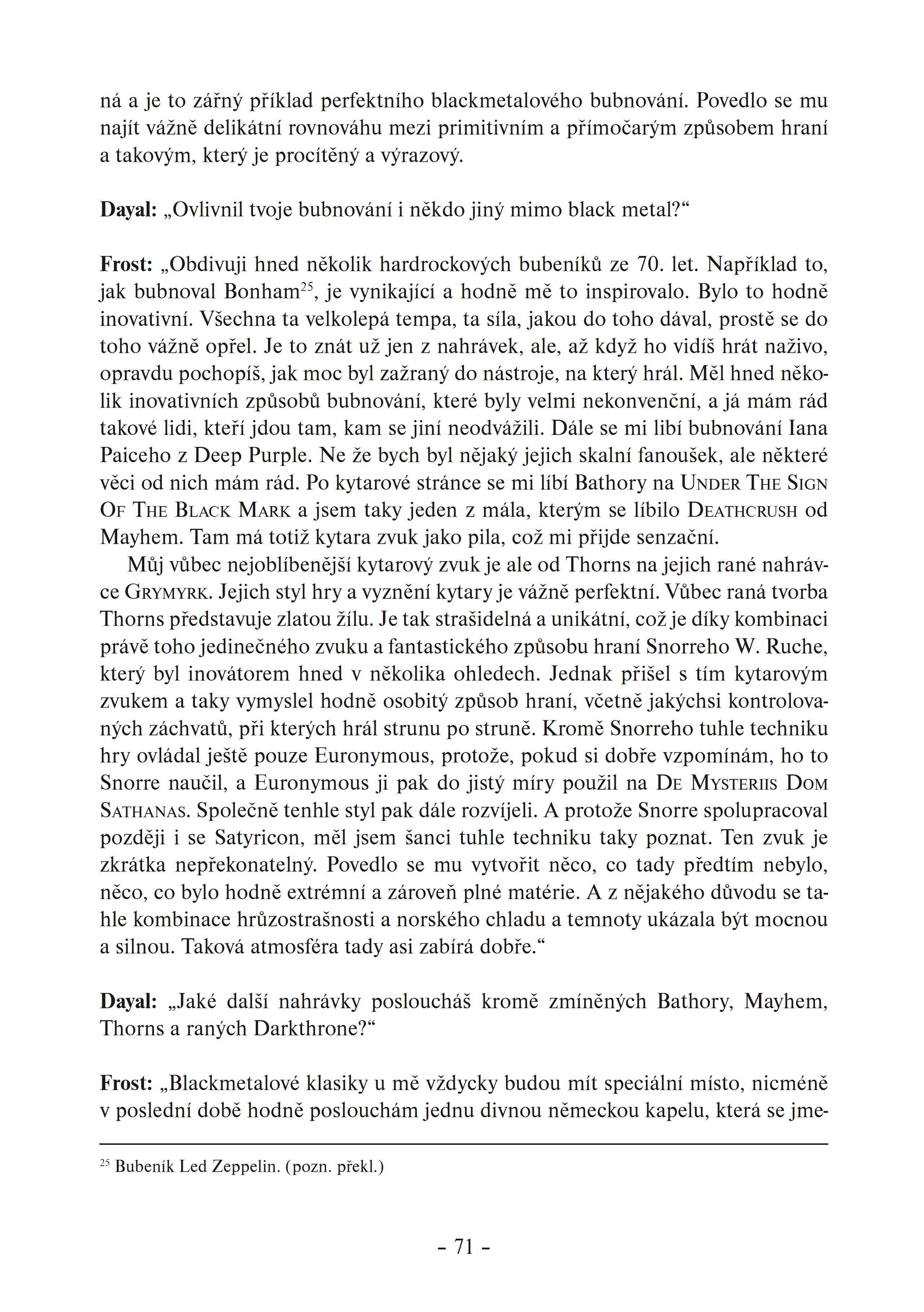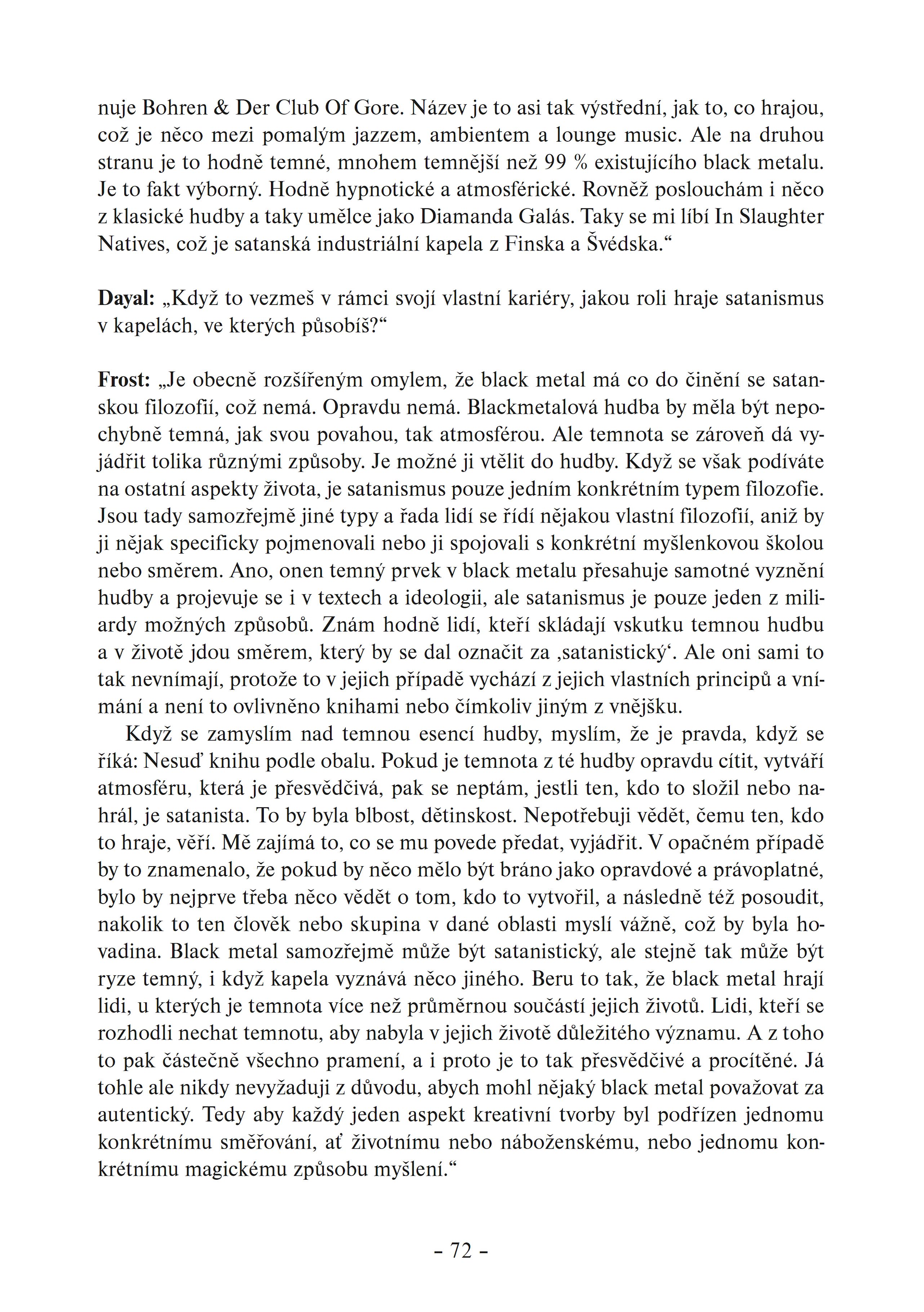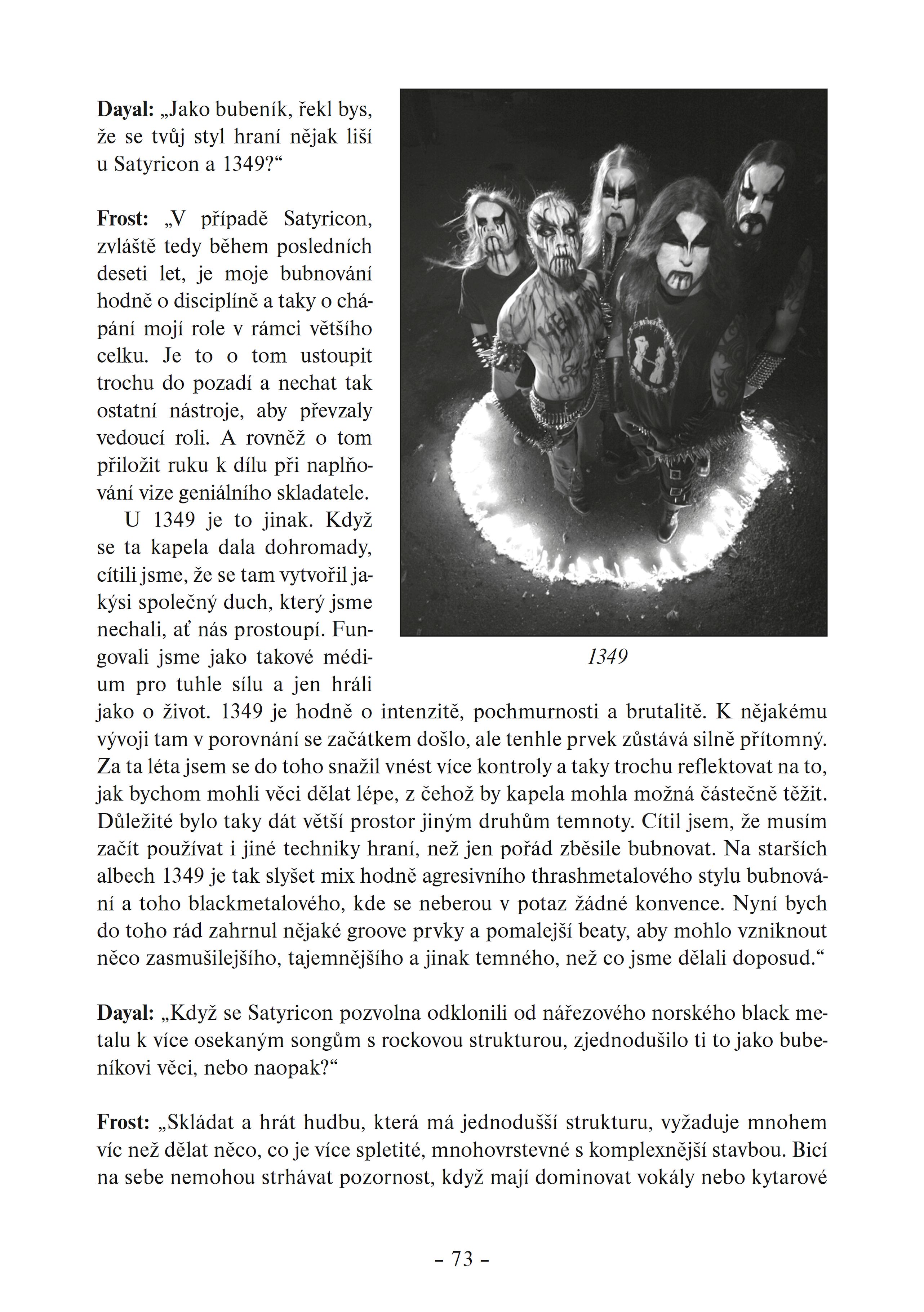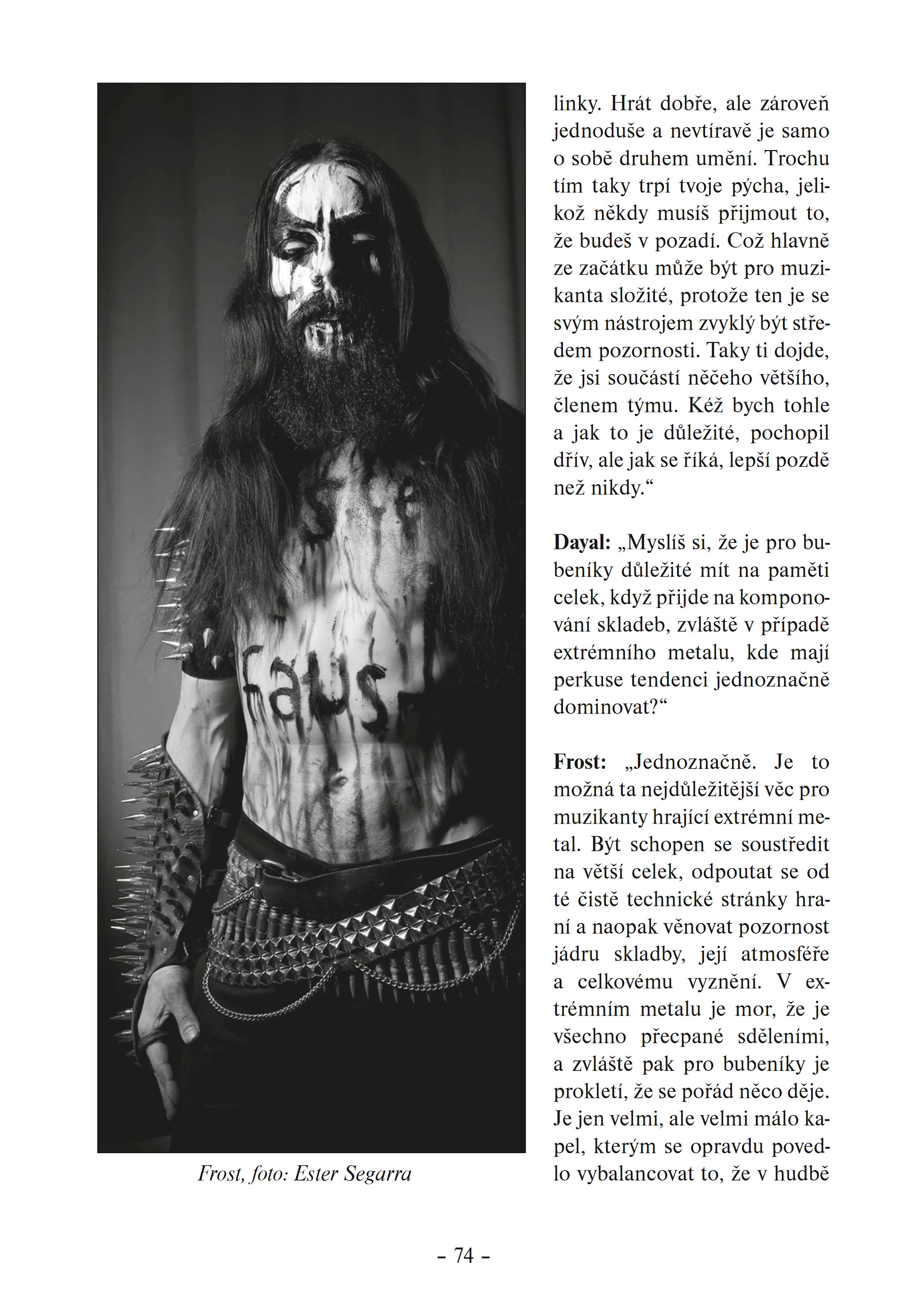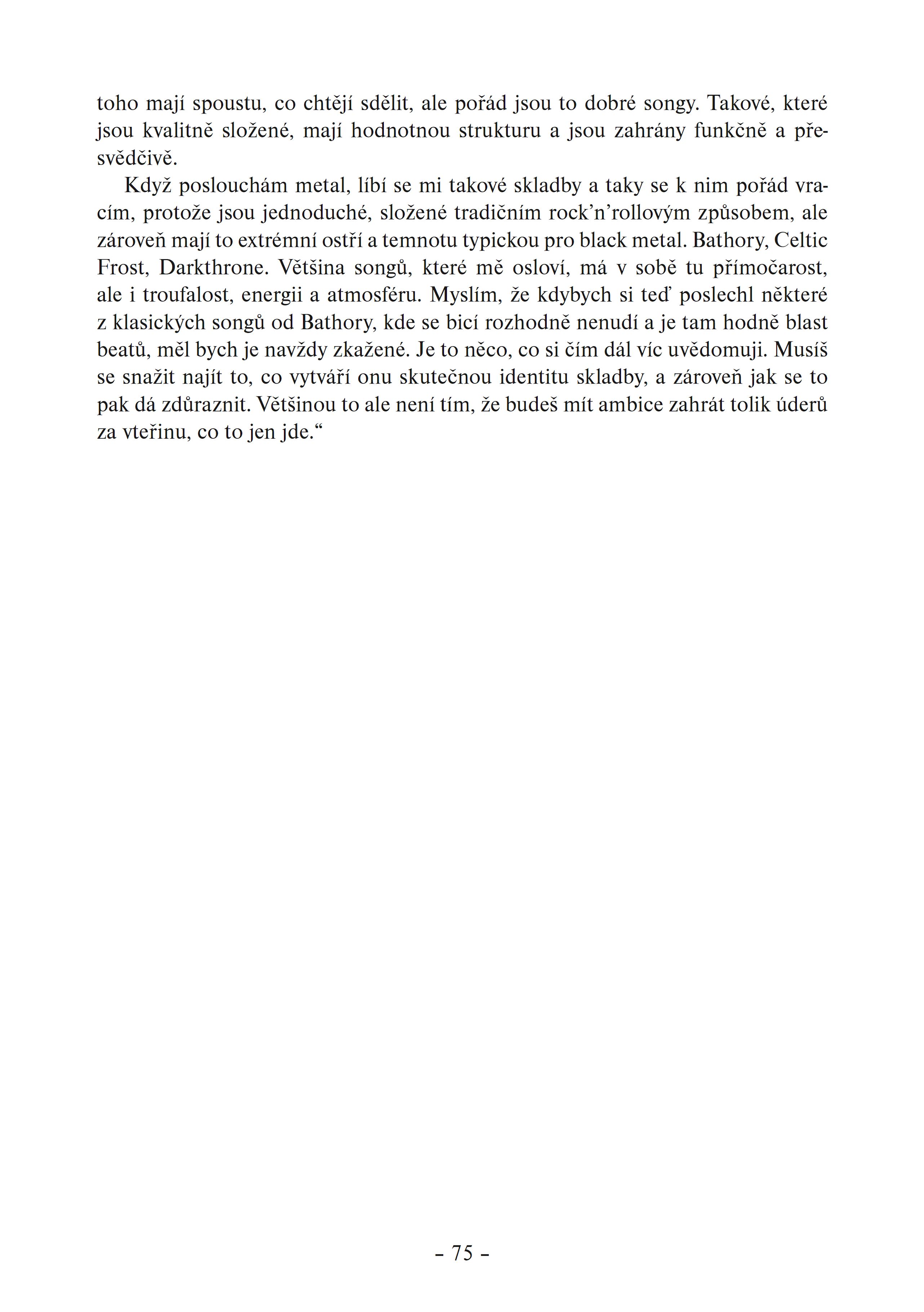Dear friends, welcome to the fifth installment of our coverage regarding the upcoming Czech edition of the pilgrimage into the black metal netherworld by the English writer and journalist Dayal Patterson. Last time, we brought you an excerpt from the first volume, today we are doing the same in case of the second one.
To sample the "Black Metal: Prelude to the Cult" book, we have here again one whole chapter, specifically the ninth one, in which you can read an interview with Kjetil-Vidar Haraldstad, a.k.a. Frost, drummer of 1349 or Satyricon.
Same as last time, the whole excerpt is presented as it will appear in the Czech translation when printed. The layout and typesetting is once again by Tomáš F. Hanzl, a.k.a. Chymus (Isacaarum, Antigod). Click on the individual images to zoom.
The English original text is as follows:
Much like his countryman Hellhammer, Frost (born Kjetil-Vidar Haraldstad) is not only one of black metal’s most respected percussionists, but also one of its best known personalities. He began his career in 1993 with Satyricon, an outfit he first contributed to as a session musician after original drummer and founding member Carl-Michael Eide departed the group, to work with the likes of Ulver, Aura Noir and Ved Buens Ende. Appearing on the band’s second demo, The Forest Is My Throne, Frost would soon enter the group as a full-time member, appearing as the only credited musician other than frontman Satyr on the debut album Dark Medieval Times. Since that time the band has remained a duo, barring live performances and the appearance of certain guest musicians.
Not content with being a part of one of Norway’s bigger acts, Frost has also devoted much of his time to another black metal outfit, 1349, taking over drumming duties from vocalist Ravn around the turn of the millennium and working with the group until the present day. He has also contributed to Gorgoroth on several occasions, acting as a full-time member between 1994 and 1995, before leaving to concentrate on Satyricon (some say at Satyr’s request), then sporadically returning both in a live setting and on record. Not only that, but in his time he has also worked with Samoth, Ihsahn and Aldrahn in the controversial and short-lived super-group Zyklon-B, and contributed to other big names such as Keep of Kalessin and Gehenna, while doing occasional design work - mostly for his own bands, but also for outside acts, including Mysticum.
Despite his busy CV, it is surely for his continued work with Satyr that he remains best known. An unlikely pairing to say the least, the two present a stark contrast in terms of character, Satyr’s carefully-planned approach to music and business, and slick, gentlemanly presentation seemingly at odds with the more eccentric and dyed-in-the-wool, old school metal approach of Frost. In a 2013 interview regarding the band’s latest opus, Satyr gave me an interesting insight into this long-running creative partnership:
Satyr: “Frost is more of an artist than a musician, his presence and the fact that he is probably of the most bizarre people on the planet adds something to it. Our taste is very similar. Our strength and willpower too, that is probably one of the reasons we have been able to work together for twenty years. We simply don’t give up. That’s installed in both of us. There’s nothing that makes him or me feel worse than if we are forced to give up, that’s the worst feeling in the world. He will keep trying until he turns blue, and I am very much the same way. We have a similar sense of humour and we are both purists when it comes to black metal.
“We are different in that I know that I’m a demanding person and that that isn’t necessarily a good thing. Frost is really, really strange – a bizarre man. And I’ve said to him many times; ‘Are you aware of this?’ and he doesn’t fully believe me. Everyone that knows him knows he is a strange man. We are also different in that I am very interested in the process and am a complete nerd about sounds and gear. Frost spent five days in the studio for the new album – I spent six months. He likes to go in there and play the drums and he has said himself that he enjoys pulling out of the process and enjoying it when the record is finished, almost like a fan. We’ve tested him, invited him to come by the studio to see what’s happening and he’s almost intimidated by that. It’s funny, the engineer and I laugh sometimes when we say, ‘Frost, come here, we want your opinion’, and he will say, ‘Okay,’ and pretend to be interested but it’s obvious he’s not. And then five minutes later he will go, ‘Oh, it’s getting kind of late isn’t it? Well this was really interesting, and I wish you the best of luck, but I have to be going. Bye!’ But that’s okay. And it’s the other way around: the only thing I like about shows is that hour and a half on stage. He keeps saying, ‘It’s a privilege to be on tour’ – shut up, it’s not a privilege, it’s terrible. But maybe he feels the same way about the studio.”
The below interview was made with Frost three years earlier and was originally intended for use in a magazine focussing on extreme metal music technique, although very quickly the remit narrowed solely to guitar technique and thus the piece never ran. Though it was not the first time I had interviewed Frost, it was certainly the most interesting conversation from my point of view, particularly with regards to his conception of black metal and drumming in general.
Dayal: When did you first realise that you wanted to play the drums?
Frost: “It must have been something that I had inside me since birth – I don’t really know and sometimes I find it to be a little strange myself. When I listened to hard rock and heavy metal music I was much more concerned with the guitar sound, and up to this day I have typically been focused on how the guitar sounds and the totality, rather than the drums – and certainly the drums as a single element. And if I get into a piece of music the drums is the last thing I would pay attention to. This has changed a little over later three or four years, but really the guitar has always been a much more central instrument for me when I listen to music, so in many ways it’s a bit weird to me that I should be a drummer.
What I know is that I was laying these simple sorts of beats when I was a little kid. I would basically just use my hands and tap things that made a sound, so this tells me that I had a certain drive in me to play a rhythmical instrument. But I didn’t really pursue such a direction until I was 14 or 15 and got myself a drum kit – that was a big thing for me and continued to be for several years. I was into extreme metal music already then, so I immediately went for playing hard and fast, but I guess it must have been around the age of 19 when I thought perhaps drumming wasn’t for me anyway, and I felt okay just being a fan of music. By then I was heavily into black metal and had more or less chosen that, not only as my music genre of choice, but also as a lifestyle. I thought that maybe rather than be a musician, I would rather be a devoted fan of the music and as I moved from my old place in the town of Lillehammer to Oslo I did not bring my drums with me and had left the whole idea of becoming a musician behind. But then it came that my friend Faust – who I knew from Lillehammer – had heard from Satyr that this band called Satyricon was in need of a drummer and he had taken the liberty of mentioning me and that I was around and available.”
Dayal: You mention that you were already following and involved in the black metal scene, were you inspired by any of the drummers within that genre in particular?
Frost: “I have a very, very deep respect for Fenriz’s work on the early Darkthrone albums. That speaks of a true genius in action, the way he plays on A Blaze In The Northern Sky in particular and also on Under a Funeral Moon - that’s enormous to me and is an example of the perfect way of playing black metal drums. He managed to find an extremely fine balance between playing in a primitive and straight forward way, but also being very, very soulful and expressive.”
Dayal: Outside of black metal, has your approach to drumming been guided by any particular musicians?
Frost: “I admire several of the hard rock drummers of the seventies. I think what Bonham did was great and very inspiring. It was very innovative, the large movements, all the force, he just got so into it. You can hear that just listening to the recordings, but especially when you see him play you understand how consumed he was by the instrument he was playing. He had several innovative solutions to playing, it was extremely unconventional and I tend to like those who go where others have not been going. I like the drumming of Ian Paice of Deep Purple – I’m not into all Deep Purple, but I definitely like some of their material. Guitar-wise I liked Bathory on Under the Sign of the Black Mark and I was also one of the few who liked Deathcrush by Mayhem, it had this kind of saw blade on the guitar I thought that was terrific.
To this day I guess my all-time favourite guitar sound is the Thorns guitar on those old Grymyrk tapes. I like that guitar sound and that sort of playing, it is perfect for me. Old Thorns material is gold. It’s so eerie, and so unique, and it’s a combination of that unique sound and Snorre Ruch’s fantastic style of playing. He was innovative in several senses; he came up with that guitar sound and he developed a very particular way of playing, including these controlled spasms when he plays these ‘string by string’ things. I know that Snorre and Euronymous were the only people mastering that technique, and if I remember correctly it was Snorre who taught Euronymous that technique, which he, to some extent, also brought with him on De Mysteriis Dom Sathanas. And they developed it further together and since Snorre was also collaborating with Satyricon later I got to know that style. But that sound is really unbeatable, he created something that wasn’t there before, something that was very extreme and very full of substance and for some reason the combination of the eeriness, the coldness and the darkness of the country of Norway proved to be potent, proved to be strong. I guess it’s the kind of atmospheres that work well here.”
Dayal: You mention an appreciation for Bathory, Mayhem, Thorns and the early Darkthrone albums – what other recordings do you find yourself listening to these days?
Frost: “The good classic black metal releases will always be held in high regard by me, but I’ve been listening a lot to a weird German band called Bohren und der Club of Gore. The name is as weird as the music I suppose, somewhere between slow jazz music, ambient music and lounge music, but it’s very dark - way darker than 99 percent of the black metal that exists. It’s terrific. Very hypnotic and atmospheric. I listen to some classical music and artists like Diamanda Galas for example. I also like In Slaughter Natives, this Satanic industrial band from Finland and Sweden.”
Dayal: In terms of your own career, what role does Satanism have within the bands you are a part of?
Frost: “There’s this misconception that black metal has anything to do with Satanic philosophy, which it hasn’t, it really hasn’t. The music should have a dark character and atmosphere, no doubt, but I think darkness can be expressed in so many different ways. You could channel it through music, but if you look at other aspects of life, Satanism is just a specific type of philosophy. There are of course other types of philosophy and lots of people have their own philosophy without really giving it a name or attributing it to any particular school or direction. So the dark element in black metal, that goes beyond the feeling of the music to ideology and lyrics, [but] Satanism is just one of a billion possible directions. I know lots of people who write truly dark music and follow a direction in life that some people would label ‘Satanic’, but which they do not do themselves because they attribute it solely and completely to their own guidelines and directions, without being influenced by any books or others.
When I consider the dark essence of music, I think it’s true what they say in Britain – the proof of the pudding is in the eating. If you can really feel a dark presence in the music – an atmosphere that is convincing – then I’m not asking, ‘Was the person writing or playing this a Satanist?’ That’s stupid, come on. It’s down to a child’s level to do that. I don’t need to know the following of the person playing. What you manage to come across with, that’s what I care about. That would mean for something to be real, to be valid, then you have to know something about who created it and perhaps question that individual’s – or the group of individual’s - sincerity in that field and it all gets stupid. Of course, black metal could be Satanic, but it could still be as genuinely dark with the band having a different kind of following. I tend to think black metal is performed by people who have more than an average level of darkness in their lives, who have decided to let darkness be an important thing in life and that’s partly where it all comes from and that’s why its convincing and heartfelt. But I never require that for a piece of black metal to be real that all that have been involved in the creative process had to have one very specific direction in life or religion or one very specific magickal way of thinking.”
Dayal: As a drummer, how would you say your technique differs between Satyricon and 1349?
Frost: “In Satyricon, especially in the last ten years, my drumming has been a lot about discipline and understanding my role in a greater totality. It has been a lot about moving a little into the background, to give room for other instruments to take the lead role, and taking part in realising the ideas of a genius composer.
Whereas in 1349 we felt we had this weird kind of spirit that just arose when the band gathered, and we tried to make ourselves a part of that spirit and just play like hell, become mediums for that spirit. 1349 is a lot about intensity and grimness and brutality. It has evolved a lot since the start but that element is strongly present. Over the years I’ve tried to bring in more control and reflect a little on what we can do to make things better and perhaps that the band can benefit a little from. It was important to give more room to a different kind of darkness. I felt that I had to bring some other drumming styles other than just playing super-intense all the time. The older 1349 albums are a mix of playing in a very aggressive thrash metal style and no holds barred black metal style, but now I want to bring in some groovier elements and slower beats to make room for something a little more sombre, something more uncanny and dark than what we did before.”
Dayal: Regarding Satyricon, has it made things easier or harder for you as a drummer that the band has gradually moved away from blasting Norse black metal into more stripped down, rock-structured songs?
Frost: “To write and perform music with a simpler structure takes a lot more than doing something which is more intricate and has more layers and more complex structures. The drums cannot take the focus when the vocals are supposed to take focus, or when the guitar lines are meant to be the dominating part or whatever. It’s an art form in itself to play well also simply and without calling for too much attention. It also challenges your sense of pride a little, because sometimes you have to choose to be in the background and in the beginning that can be hard for a musician that is used to taking a lot of attention, and having a lot going on with his own instrument. You also realise that you’re part of something else, you’re part of a team. I wish I had understood this and the importance earlier, but better late than never as they say.”
Dayal: Do you think it’s important for drummers to be aware of the bigger picture when it comes to song writing, particularly in extreme metal which has a tendency to become very dominated by percussion?
Frost: “Absolutely, perhaps that is the most important thing for extreme metal musicians – to manage to focus on the big picture and bring attention away from the technicality and towards the core substance of songs, the atmosphere, the wholeness. It’s a disease in extreme metal that everything is so loaded with information and for drummers especially it’s a curse that so much has to go on all the time. It’s fucking annoying. There are very, very few bands that actually manage to find a good balance from having the music packed with information and still have good songs, things that are well written, well-structured and performed in a convincing and functional way.
When I listen to metal music, the songs I tend to like, and listen to year after year, are simple songs written in a traditional rock n roll fashion, but given that edge and extremity and darkness that typifies black metal. Bathory, Celtic Frost, Darkthrone; most of the songs I find I really get into are really simple but have nerve and energy and atmosphere. I think if I were to listen to some of the classic Bathory songs and there were lots of things going on with the drums, and lots of blastbeats, those songs would have been ruined forever. This is something I’m increasingly aware of; you have to try find out what creates the true identity of the song and how you can really emphasise it. And in most cases it is not cabout playing as many notes per second as possible.”
So, enjoy and more next time!







